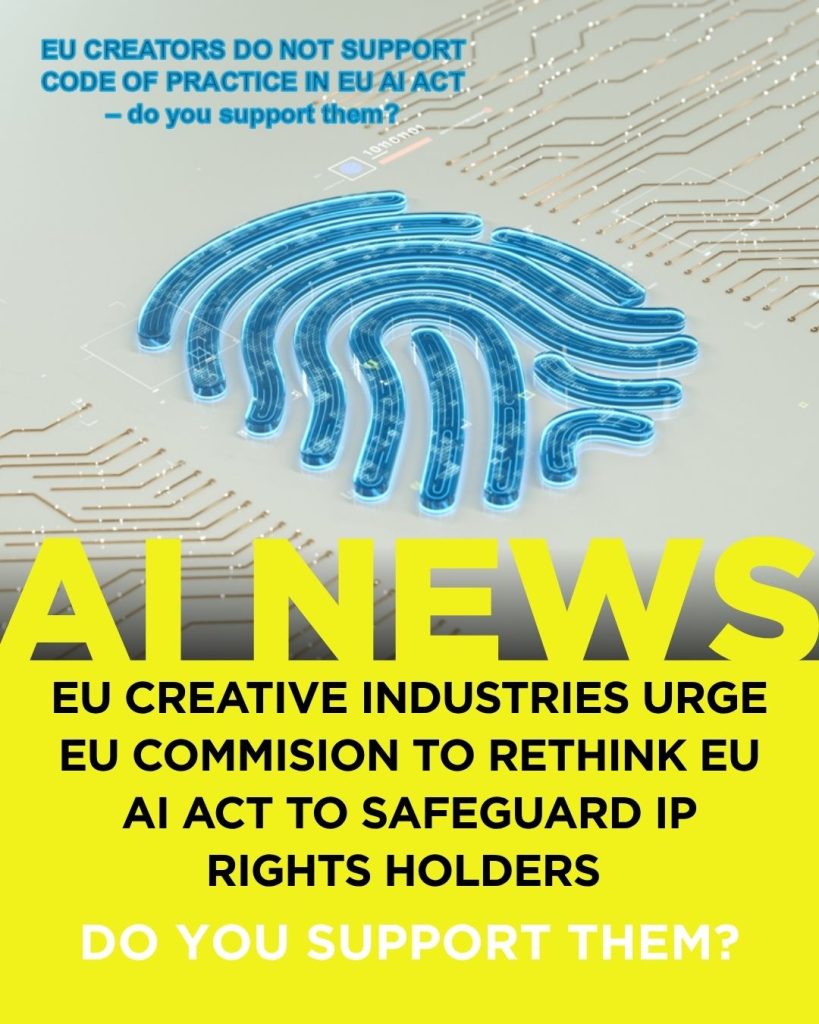

GESAC, the European Grouping of Societies of Authors and Composers comprises 32 authors’ societies from all over Europe have made a joint statement.
“Despite the extensive, highly detailed and good-faith engagements by rightsholder communities throughout this process, the final outcomes fail to address the core concerns which our sectors – and the millions of creators and companies active in Europe which we represent – have consistently raised. The result is not a balanced compromise; it is a missed opportunity to provide meaningful protection of intellectual property rights in the context of GenAI and does not deliver on the promise of the EU AI Act itself.
We remind the European Commission that Article 53(1)(c) and (d) of the EU AI Act and related provisions were specifically designed to “facilitate holders of copyright and related rights to exercise and enforce their rights under (European) Union law” in response to ongoing, wholesale unlicensed use of their works and other protected content by GenAI model providers in disregard of EU rules. However, the feedback of the primary beneficiaries these provisions were meant to protect has been largely ignored in contravention of the objectives of the EU AI Act as determined by the co-legislators and to the sole benefit of the GenAI model providers that continuously infringe copyright and related rights to build their models.
In 2024, the cultural and creative sectors across Europe welcomed the principles of responsible and trustworthy AI enshrined in the EU AI Act, intended to ensure mutually beneficial growth of innovation and creativity in Europe. Today, with the EU AI Act implementing package as it stands, thriving cultural and creative sectors and copyright intensive industries in Europe which contribute nearly 7% of EU GDP, provide employment for nearly 17 million professionals and have an economic contribution larger than European pharmaceutical, automobile or high-tech industries, are being sold out in favour of those GenAI model providers. The deployment of GenAI models and content production systems which also make extensive use of scraping is already underway.
The damage to and unfair competition with the cultural and creative sectors can be seen each day. The cultural and creative sectors must be safeguarded, as they are the foundations of our cultures and the Single Market. We wish to make it clear that the outcome of these processes does not provide a meaningful implementation of the GPAI obligations under the AI Act. We strongly reject any claim that the Code of Practice strikes a fair and workable balance or that the Template will deliver “sufficient” transparency about the majority of copyright works or other subject matter used to train GenAI models. This is simply untrue and is a betrayal of the EU AI Act’s objectives.
We call on the European Commission to revisit the implementation package and enforce Article 53 in a meaningful way, ensuring that the EU AI Act lives up to its promise to safeguard European intellectual property rights in the age of generative AI. We also call on the European Parliament and Member States, as co-legislators, to challenge the unsatisfactory process of this exercise, which will further weaken the situation of the creative and cultural sectors across Europe and do nothing to tackle ongoing violations of EU laws”
Dids Macdonald OBE., Chair & Co-Founder of Anti Copying Design (ACID) said, “We stand united with GESAC’s request to the European Commission to revisit Article 53. Unless there is a legal obligation from Big Tech to sign a Code of Conduct, it provides no safeguards for the human ingenuity of creators, essential if both are to work together”.
See the entire statement including information about all members of GESAC.
Spread the Word
| Cookie | Duration | Description |
|---|---|---|
| cookielawinfo-checkbox-analytics | 11 months | This cookie is set by GDPR Cookie Consent plugin. The cookie is used to store the user consent for the cookies in the category "Analytics". |
| cookielawinfo-checkbox-functional | 11 months | The cookie is set by GDPR cookie consent to record the user consent for the cookies in the category "Functional". |
| cookielawinfo-checkbox-necessary | 11 months | This cookie is set by GDPR Cookie Consent plugin. The cookies is used to store the user consent for the cookies in the category "Necessary". |
| cookielawinfo-checkbox-others | 11 months | This cookie is set by GDPR Cookie Consent plugin. The cookie is used to store the user consent for the cookies in the category "Other. |
| cookielawinfo-checkbox-performance | 11 months | This cookie is set by GDPR Cookie Consent plugin. The cookie is used to store the user consent for the cookies in the category "Performance". |
| viewed_cookie_policy | 11 months | The cookie is set by the GDPR Cookie Consent plugin and is used to store whether or not user has consented to the use of cookies. It does not store any personal data. |